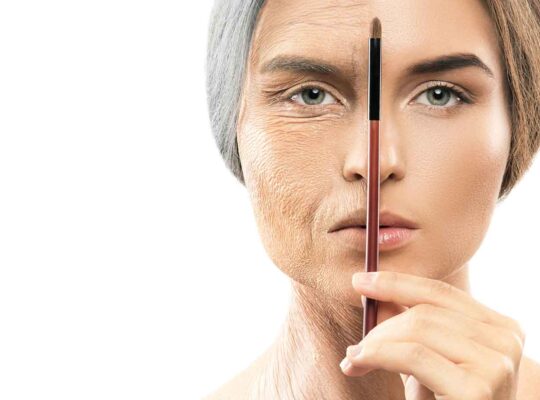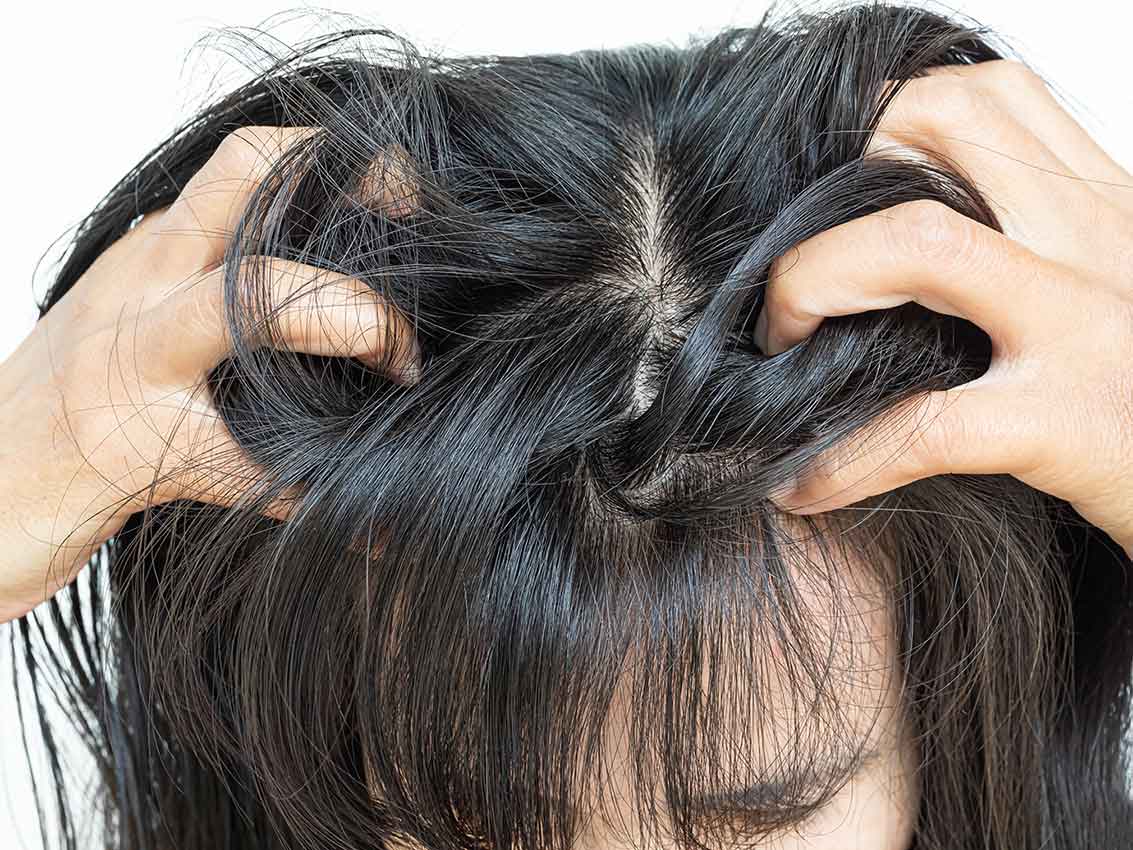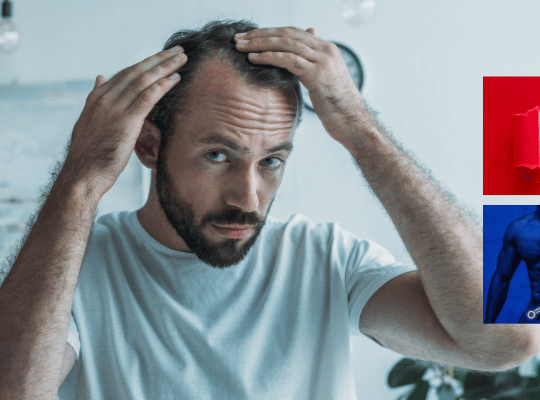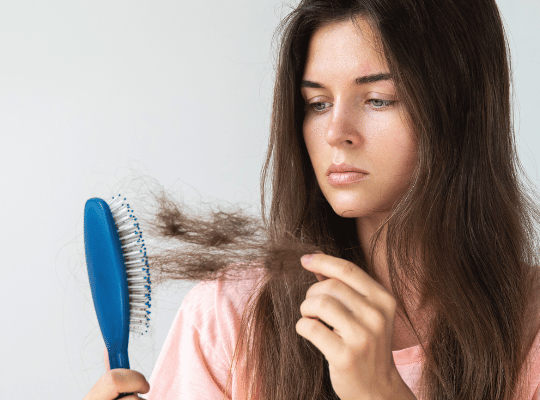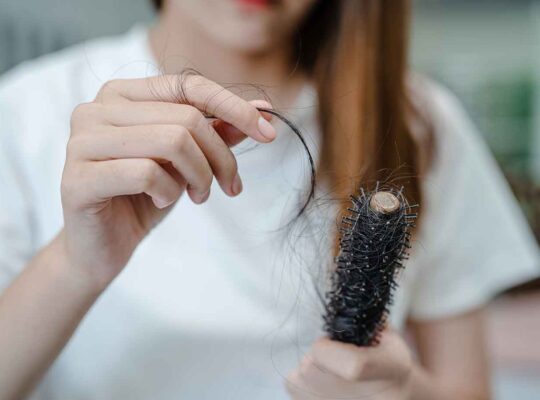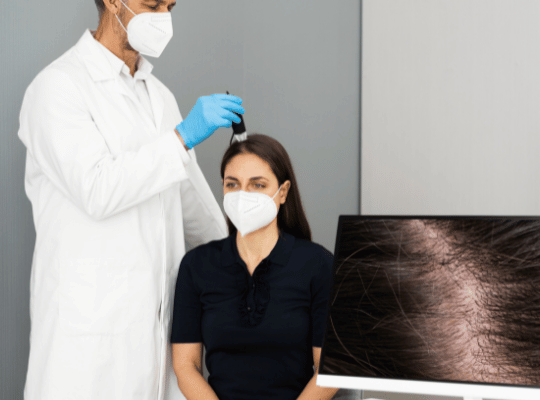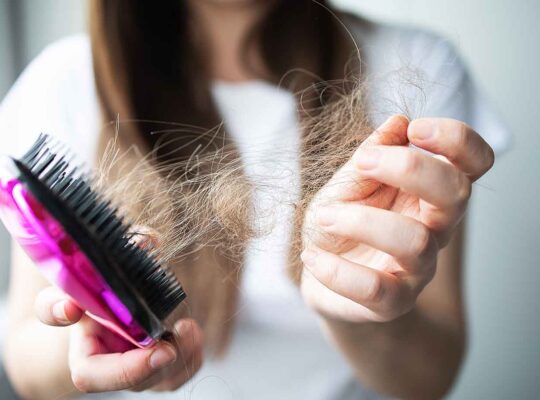Are you worried about losing hair and wondering if it’s because of PCOS? If you have Polycystic Ovary Syndrome (PCOS), you might have noticed more hair coming out when you brush or wash your hair. PCOS is a common condition that affects many women, and hair loss is one of the symptoms that can be really upsetting. It’s important to understand why this happens, how to prevent it, and what you can do to manage it. Let’s explore the connection between PCOS and hair loss, how it’s diagnosed, and the best ways to handle it.
Understanding PCOS and Hair Loss
What is PCOS?
Polycystic Ovary Syndrome (PCOS) is a condition that affects women’s hormones. It can cause many different symptoms, which can be different for each person. The most common symptoms of PCOS include:
- Irregular periods or no periods at all
- Gaining weight or having trouble losing it
- Acne or oily skin
- Extra hair growth on the face and body (this is called hirsutism)
- Thinning hair or hair loss, especially on the scalp
What is Female Pattern Hair Loss (FPHL) in PCOS?
One of the most challenging symptoms of PCOS is Female Pattern Hair Loss (FPHL). This type of hair loss happens in women, usually causing thinning hair on the top and front parts of the scalp. For women with PCOS, FPHL can be more noticeable because of the hormone changes that come with the condition.
How Common is Hair Loss in PCOS Patients?
Hair loss is a common issue for women with PCOS. Studies show that about 40-70% of women with PCOS deal with some level of hair thinning or hair loss. This can range from just a little thinning to more severe hair loss, which can really affect how a woman feels about herself.
The Science Behind Hair Loss in PCOS
How Do Hormonal Imbalances Cause Hair Loss?
The main reason for hair loss in women with PCOS is hormonal imbalance. PCOS can cause your body to make too many androgens, which are hormones that are usually higher in men, like testosterone. Women normally have some androgens, but in PCOS, these levels can be too high, leading to symptoms like hair loss.
What is Hyperandrogenism and How Does it Affect Hair Follicles?
Hyperandrogenism means having too many androgens in your body, and it’s a big part of PCOS. When there are too many androgens, they can make the hair follicles on your scalp shrink. This shrinking can cause your hair to thin out or fall out completely. This type of hair loss is called androgenic alopecia or FPHL. Interestingly, while androgens can cause hair loss on your head, they can also make hair grow more on other parts of your body, like your face.
Are There Other Factors Contributing to Hair Loss in PCOS?
Besides hormones, other things can make hair loss worse in PCOS, like:
- Insulin resistance, which is when your body has trouble using insulin, a hormone that controls blood sugar. High insulin levels can make hormone imbalances worse and lead to hair loss.
- Inflammation: PCOS often comes with chronic inflammation, which can weaken hair follicles and cause hair loss.
- Stress: Dealing with the symptoms of PCOS can be stressful, and stress itself can make hair loss worse.
Diagnosing Hair Loss in PCOS
What Are the Common Diagnostic Methods?
To figure out if your hair loss is due to PCOS, doctors usually use a few different methods:
- Medical history and physical exam: The doctor will ask about your symptoms and if anyone in your family has hair loss. They will also look at your scalp to see how much hair you’ve lost.
- Blood tests: These tests check your hormone levels to see if they’re normal and rule out other causes of hair loss.
- Scalp biopsy: Sometimes, a small piece of skin from your scalp is taken to look at the hair follicles under a microscope. This can help confirm if your hair loss is from PCOS.
Why Is Early Detection Important?
Early detection of hair loss is important because the sooner it’s diagnosed, the better the chances of slowing it down or stopping it. If you notice that your hair is thinning or you’re losing more hair than usual, it’s a good idea to see a doctor right away. Starting treatment early can help keep your hair healthier longer.
What Are the Challenges in Diagnosis?
It can be tricky to diagnose hair loss from PCOS because hair loss can be caused by many different things, not just PCOS. Other health issues like thyroid problems or a lack of certain nutrients can cause hair loss too. This is why it’s important to have a thorough check-up with a doctor to make sure you get the right diagnosis and treatment.
Treatment Options for Hair Loss in PCOS
What Are the First-Line Treatments?
The first treatments for hair loss in PCOS usually focus on fixing the hormone imbalance. Some common first-line treatments include:
- Minoxidil: This is a liquid or foam you put on your scalp. It helps hair grow back and is often the first treatment doctors suggest for FPHL.
- Oral contraceptives: Also known as birth control pills, these can help balance your hormones by lowering androgen levels, which can reduce hair loss.
- Anti-androgens: Medicines like spironolactone block the effects of androgens on your hair follicles, which can help stop hair loss.
What Are the Second-Line Treatments?
If the first treatments don’t work well enough, doctors might suggest second-line treatments like:
- Low-level laser therapy (LLLT): This treatment uses light to help your hair follicles grow stronger hair. It’s a painless option that some people find helpful.
- Platelet-rich plasma (PRP) therapy: In this treatment, your blood is taken, processed to concentrate the platelets, and then injected into your scalp. The growth factors in PRP can help your hair grow back.
- Hair transplants: If you have significant hair loss, surgery to move hair follicles from one part of your scalp to another may be an option.
What Are Emerging Therapies?
There are also new treatments being developed that might help with hair loss in PCOS:
- Stem cell therapy: This is an experimental treatment that uses stem cells to help repair and grow new hair.
- New medications: Researchers are working on new drugs that target the specific causes of hair loss in PCOS, which might be more effective than current treatments.
How Do Fertility and Hirsutism Affect Treatment Choices?
When treating hair loss in PCOS, doctors also think about other symptoms like fertility and hirsutism (extra hair growth). Some treatments, like birth control pills, can help with both hair loss and other symptoms. However, if you’re trying to get pregnant, your doctor might choose other treatments that won’t affect your fertility.
Lifestyle Modifications to Manage Hair Loss in PCOS
Why Is Weight Management Important?
Managing your weight is important when dealing with PCOS because carrying extra weight can make hormone imbalances worse, which can lead to more hair loss. Losing even a little bit of weight can help improve your hormone levels and reduce hair loss.
What Are the Best Dietary Recommendations?
Eating a healthy diet is also key for managing PCOS and hair loss. Some dietary tips include:
- Low-glycemic index foods: These foods don’t cause big spikes in blood sugar, which helps manage insulin levels.
- High-fiber foods: Fiber helps regulate blood sugar and can support hormone balance.
- Lean proteins: Eating chicken, fish, and beans can help stabilize your blood sugar levels.
How Can Exercise Benefit Hair Health?
Regular exercise is great for managing PCOS and can help reduce hair loss by:
- Improving insulin sensitivity: Exercise helps your body use insulin better, which reduces insulin resistance.
- Reducing stress: Being active is a great way to lower stress, which can help prevent hair loss.
- Boosting overall health: Staying active keeps your body healthy, which can have a positive effect on your hair and skin.
Psychological Impact of Hair Loss in PCOS
How Does Hair Loss Affect Emotions and Social Life?
Losing your hair can really affect how you feel about yourself and how you interact with others. It can lead to feelings of embarrassment or sadness, and might even make you want to avoid social situations. This can be especially tough for women, who often see their hair as a big part of their identity.
What Are Some Coping Strategies?
If you’re dealing with hair loss due to PCOS, here are some ways to cope:
- Talk about it: Sharing your feelings with someone you trust can help you feel less alone.
- Try new hairstyles: Experimenting with different looks or using accessories like scarves can make you feel more confident.
- Seek support: Joining a support group for women with PCOS can provide comfort and advice from others going through the same thing.
Why Is a Support System Important?
Having a support system is really important when dealing with the challenges of PCOS, including hair loss. Whether it’s friends, family, or a support group, surrounding yourself with people who understand what you’re going through can make a big difference.
Comparison of Treatment Options for Hair Loss in PCOS
| Treatment | Effectiveness | Side Effects | Considerations |
|---|---|---|---|
| Minoxidil | Moderate | Scalp irritation | Needs to be used continuously |
| Anti-androgens (e.g., Spironolactone) | High | Hormonal side effects | Not recommended if you’re pregnant |
| Oral contraceptives | High | Nausea, weight gain | Can also help with acne and period issues |
| Low-level laser therapy | Moderate | None reported | Non-invasive, but requires several sessions |
| Platelet-rich plasma (PRP) | Moderate | Scalp discomfort | Involves multiple treatments, still a new therapy |
Future Directions in PCOS Hair Loss Management
What Are the Latest Research and Clinical Trials?
Researchers are always looking for better ways to treat hair loss in PCOS. Ongoing research and clinical trials are testing new approaches, including medications and therapies that might work better than current options.
What Potential New Treatments Are on the Horizon?
Some new treatments being explored include:
- Advanced hormone therapies: These target the hormonal causes of hair loss more accurately, with fewer side effects.
- Personalized medicine: This approach tailors treatments to each person’s unique genetic makeup and hormonal profile.
How Can Machine Learning Aid in Early Detection and Management?
Machine learning and artificial intelligence are being used to develop tools that can help detect hair loss early in PCOS patients. These technologies can analyze hormone levels, genetics, and other factors to predict who might lose hair and suggest personalized treatments.
Conclusion
Hair loss with PCOS can be really tough to deal with, but understanding what causes it and knowing your treatment options can help. Early detection and a good treatment plan can make a big difference in how well you manage your symptoms.
If you’re struggling with hair loss due to PCOS, don’t hesitate to talk to a healthcare provider and seek support. You’re not alone, and with the right care, you can manage your symptoms and feel better.
FAQs About Hair Loss with PCOS
- Can hair loss from PCOS be reversed?
- Sometimes, hair loss from PCOS can be improved with treatment, but it varies from person to person. The sooner you start treatment, the better your chances.
- What is the best treatment for hair loss in PCOS?
- A mix of lifestyle changes, medications like minoxidil or anti-androgens, and sometimes new therapies like PRP can help manage hair loss.
- How does weight loss help with hair loss in PCOS?
- Losing weight can improve hormone balance and reduce insulin resistance, which might help reduce hair loss.
- Can oral contraceptives help with hair loss in PCOS?
- Yes, birth control pills can balance hormones and reduce androgen levels, which may help with hair loss.
- Is hair loss in PCOS permanent?
- Hair loss in PCOS isn’t always permanent. With the right treatment, it’s possible to see hair regrowth.


